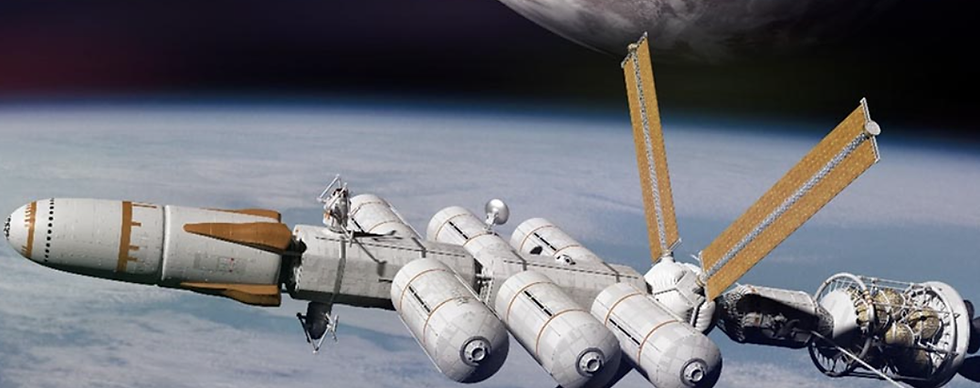Factories in the Void: Industrial Leadership Beyond Earth
- Speciale Invest

- Jul 16, 2025
- 3 min read

Manufacturing in the Final Frontier: An Opportunity for India’s Space Tech Startups
The space industry witnessed a pivotal moment last week when Varda Space Industries announced a solid $187 million Series C funding round. The investment has trained the spotlight on the nascent field of space manufacturing – one that Indian space-tech startups such as Inbound Aerospace, for example, also see as a huge opportunity.
Varda's mission to build pharmaceutical laboratories in orbit, tapping microgravity to create drug formulations not possible on Earth, as the molecules crystallise differently, represents just the tip of the iceberg in a promising blue ocean, or should we say deep space, market that's capturing global attention.
India’s Inbound Aerospace was founded only in 2023 and incubated at IIT Madras. Founders Aravind IB, Capt. Abhijit Bhutey and Vishal Reddy are developing Low-Earth-Orbit (LEO) free-flying and recoverable spacecraft that customers can deploy to conduct experiments and manufacture products in microgravity before returning them to Earth.
They expect that applications will include wide band gap semiconductors for advanced power electronics, ultra-high bandwidth fibre optics for communications, high-purity protein crystals for next-generation pharmaceuticals, scaffold-free 3D bioprinting for regenerative medicine, and protein-based artificial retinas for vision restoration.
The entrepreneur trio is drawing from backgrounds at IIT Madras and former leadership roles at the Indian Navy and ISRO, and tapping India's growing space ecosystem to accelerate development.
Inbound Aerospace is focused on the specific advantages that microgravity offers for manufacturing. For example, in space, fine particles within liquids remain uniformly mixed rather than settling to the bottom, air bubbles distribute evenly instead of floating to the surface, and convection currents — which require gravity to function — are eliminated.
These conditions can help produce materials with superior structural properties and fewer defects.
India's private space sector is on the rise, with the overall space economy in the country projected to grow from $9 billion in 2025 to $44 billion by 2033. There are close to 200 Indian space startups, doubling from 2024, according to one estimate.
Other notable Indian ventures that can potentially service the space manufacturing segment include Inspecity, which is developing in-space services such as automated repairs of satellites, and Bellatrix, which is building a ‘space taxi’ service that can take payloads to specific destinations in orbit.
Inbound Aerospace's participation in the AWS India Space Accelerator programme’s 2024 cohort, alongside 23 other Indian space startups, demonstrates the growing recognition of India's potential in this sector. It was the first country-specific programme that AWS was launching at the time.
The in-space manufacturing market expanded from $0.98 billion in 2024 to $1.22 billion in 2025, and it’s expected to reach $2.87 billion by 2029 as the number of satellites, especially the LEO variety, is expected to continue to rise. In India, the combination of both public policy and startup funding initiatives and growing VC backing is lowering the entry barrier for entrepreneurs in space tech.
The broader space economy context is also compelling, expected to go from $570 billion in 2023 to as much as $2 trillion by 2040, with commercial revenues accounting for much of the industrial activity.
On the tech front, advances are coming to the fore in space technology, the development of materials with superior qualities, the integration of robotics and artificial intelligence, and the emergence of novel space manufacturing technologies and processes. The idea of a ‘space factory’ or a factory in space is no longer science fiction.
As microgravity manufacturing matures, expect to see breakthroughs in pharmaceuticals, bio-printed tissues, advanced electronics with unprecedented performance characteristics, and a breathtaking range of other products. This activity will also drive international collaboration among startups and government agencies worldwide.
Varda Space's successful funding round is but one example that investors now view orbital factories as a viable near-term opportunity. The company’s funding was led by well-known tech investors Natural Capital and Shrug Capital, with participation from Lux Capital, billionaire Peter Thiel, Founders Fund, and Khosla Ventures. The investment took Varda’s total equity funding to $329 million.
In India, startups such as Inbound Aerospace have the opportunity to become the nation’s champions in this global space race. Winners will help shape not just the future of industry, but humanity's expansion into the final frontier.



